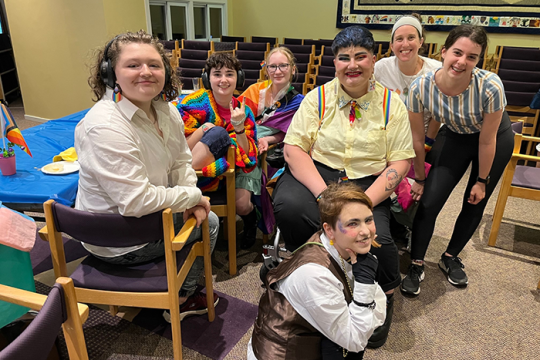
The idea of Audacious Hospitality, by itself, means nothing if we do not apply its tenets in the way we lead our communities. However, determining where to start can be a difficult process, especially if these are the first conversations you and your community have been holding around racial equity, diversity, and inclusion (REDI).
That’s where the Audacious Hospitality Community Self-Assessment Tool comes in.
What is the Assessment Tool?
This “idea checklist” is a starting point for reflection, conversation, and action within your community. It is intended to help your leadership team identify the steps needed to become a community rooted in principles of REDI, help you build on your existing measures, and aid in initiating new ones.
The tool is divided into sections related to different aspects and cohorts of our communities:
- Audacious Hospitality (General)
- Interfaith Families and the Exploration of Judaism
- Embracing Racial and Ethnic Diversity
- LGBTQ+ Inclusion
- Disabilities Inclusion and Accessibility.
Each section includes a list of related statements, which can be answered with “Yes,” “No,” and “Unsure,” for example, “We hold ongoing discussions and trainings about racial and ethnic diversity, white privilege and racial justice.”
Who should take the assessment?
Before you dive in, determine who in your community should take this assessment. Take your community’s diversity into consideration when it comes to (but not limited to): gender, age, sexuality, race, ethnicity, ability status, relationship status, family composition, etc.
Keep in mind that your congregation’s demographics will change; the more diverse your group of assessors are, the more you can incorporate diverse voices into your work and engage members, both current and future.
How should it be taken/debriefed?
For most accurate results, this assessment should be taken individually and then ideally debriefed as a group. You can find our more in-depth suggestions for each step, from taking the assessment to debriefing, in the assessment tool itself.
Keep in mind that many of us with marginalized identities have negative experiences sharing our stories about discrimination, and therefore may be hesitant to do so when talking in your group. Likewise, those of us from dominant groups (heterosexual, cisgender, wealthy, white, not living with disabilities, etc.) may feel guilt or shame from hearing said experiences.
These feelings are valid but should be handled in a way that doesn’t derail the conversation at hand. For example: white people processing these emotions should do so in the company of other white people, cisgender people should process theirs with other cisgender people, etc.
Where do we begin?
Ready to get started? Download the Audacious Hospitality Community Assessment Workbook now – then join the Audacious Hospitality group in The Tent to connect with other Reform leaders who are doing this work, as well.
For more resources related to racial justice and antiracism work, visit urj.org/justiceforall.
Have something to say about this post? Join the conversation in The Tent, the communications and collaboration platform for congregational leaders of the Reform Movement. You can also tweet us or tell us how you feel on Facebook.
Related Posts

Setting Your Leaders Up For Success

Safety, Equity, and Accountability is the Path to a Thriving Jewish Community
